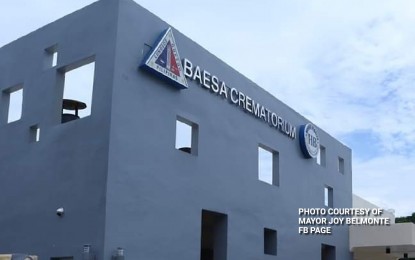
Baesa Crematorium in Quezon City. (File photo)
MANILA – The Department of the Interior and Local Government (DILG) on Tuesday said local government units (LGUs) should ensure that the remains of confirmed and suspected Covid-19 cases in their localities are cremated or buried within 12 hours after death.
“The remains of persons who died of communicable diseases such as Covid-19 are potentially infectious and standard precautions should be implemented for every case. Kaya dapat siguruhin ng mga local governments na may nakatalagang funeral parlor at crematorium sa kanilang lugar na mamamahala sa mga labi ng namatay sa (This is why local government should ensure that there are designated funeral parlors and crematoriums in their areas that will handle the remains of those who died due to) Covid-19,” DILG Secretary Eduardo Año said in a news release.
He pointed out that while cremation is preferred, the same cannot apply to Muslims because it is forbidden in their religion.
“Hence, all remains of our Muslim brothers cannot be cremated but must be buried in the nearest Muslim cemetery within 12 hours from death,” he said.
In places where there are no crematoriums, the standard burial process within 12 hours should apply.
Año issued the statement after receiving reports that some LGUs refuse entry in their localities to cadavers of Covid-19 cases for burial or cremation purposes as well as LGUs with identified Muslim cemeteries who restrict the burial of a Muslim who died as a suspect or a confirmed Covid-19 case.
“No LGU shall prohibit the cremation or burial of Covid-19 cadavers in a cemetery or memorial park located in his or her area of jurisdiction,” he said.
Año also urged LGUs to provide possible financial assistance to cover the logistics, fuel, salary and other expenses that will be incurred in the process which include transfer or transport of human remains.
“The cost of burial or cremation of a dead person shall be borne by the nearest kin. If the family is not financially capable of defraying the expenses or if the deceased had no kin, the cost shall be borne by the city or municipal government and the Department of Social Welfare and Development (DSWD),” he said.
He said that the Inter-Agency Task Force for the Management of Emerging Infectious Diseases (IATF-EID) has set aside PHP25,000 for each indigent bereaved family of suspected or confirmed Covid-19 cases through the DSWD.
He also advised LGUs to issue a price cap or impose a price ceiling on funeral services located within their jurisdiction to prevent overpricing.
He added that any crematorium service or funeral parlor who will refuse to accept cadavers would be closed permanently by canceling its business permit.
“LGUs shall monitor and penalize funeral parlors and crematoriums that refuse to provide logistics and transport of suspect or confirmed Covid-19 remains, including refusal to pick-up the remains,” he said.
Funeral workers are front-liners too
Meanwhile, DILG spokesperson, Undersecretary Jonathan Malaya said that funeral services staff and personnel may also be considered among the front-liners amid the Covid-19 pandemic.
“Funeral workers are also risking their safety in order to provide proper burial or cremation of the dead. They must also be accorded the same safety measures as health workers,” Malaya said.
He said that funeral workers are granted exemptions from the enhanced community quarantine to be able to freely move and travel to ensure that the remains of deceased individuals will be given proper funeral services.
“The LGUs are enjoined to ensure funeral companies are to provide transportation and/or housing accommodations for funeral service staff and that all personnel handling the dead body are required to wear the appropriate personal protective equipment (PPE) while performing their tasks. All PPE (sets) shall be properly disposed of, preferably burned for disposable and properly disinfected for non-disposable, after its use,” he said in accordance with Memorandum Circular 2020-063. (PR)
